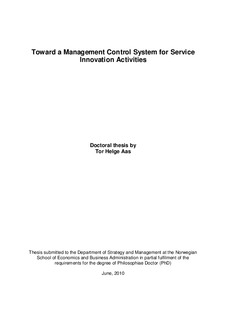Toward a Management Control System for Service Innovation Activities
Doctoral thesis
Permanent lenke
http://hdl.handle.net/11250/276841Utgivelsesdato
2010Metadata
Vis full innførselSamlinger
Sammendrag
The doctoral project reported in this thesis was carried out as an integral part of the larger
TIPVIS project (Service Innovation Research Project in the Norwegian Graphic Arts
Industry). This project aimed to improve the participating firms’ ability to carry out service
innovation activities. Several managers participating in TIPVIS emphasized the importance of
ex-ante value assessment, and were concerned about the paucity of guidance offered by the
extant research literature on the design of value assessment tools. The aim of this thesis was
therefore to propose a design of a value assessment tool for service innovation ideas.
Knowledge of relevant existing best practices and of the potential effects of service
innovation are necessary when constructing a value assessment tool. However, these topics
have not been discussed much in the service innovation literature. Four studies were
undertaken to help fill these literature gaps. An exploratory study provided insights about best
practices. A literature review produced an overview of the potential effects of service
innovation. A conceptual study explored the relationship between service innovation and
sustained competitive advantage, and an explanatory study detailed the relationship between
service innovation and financial performance.
By combining the findings of the four studies with general insights from the research stream
on innovation investment appraisal, this thesis develops a value assessment tool for service
innovation ideas, called the QSI (tool for pre-Qualification of Service Innovation projects).
The proposed QSI design is composed of three modules that combine business strategy
methods, scenario analysis, capital investment-appraisal techniques, scoring models, and
foresight methods. The tool was tested with real service innovation ideas in three firms using
an interventionist research approach, and the QSI implementation was found to provide
considerable assistance to the managers.
The findings of this study thus have evident implications for ex-ante management control of
service innovation activities. This thesis further suggests that the findings may also have
implications for the design of developmental, ex-post, and strategic management control
systems for service innovation activities. The thesis contributes theoretically to the research
streams on innovation effects and on management control of innovation activities. These
contributions establish a foundation for further research in these areas.

